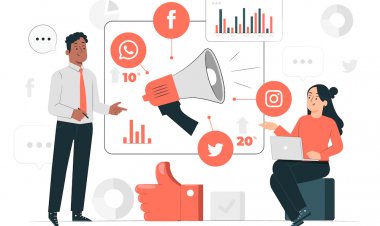Top Communication Skills you need to Master Right Now
In today’s surroundings, among the most critical abilities for learners and professionals to have is communication. All educational institutes and firms highly value having it as one of their most desirable abilities. Students and professionals must have strong communication skills to convey themselves clearly and positively while speaking to others, reading, and writing in academic

In today’s surroundings, among the most critical abilities for learners and professionals to have is communication. All educational institutes and firms highly value having it as one of their most desirable abilities. Students and professionals must have strong communication skills to convey themselves clearly and positively while speaking to others, reading, and writing in academic settings and the majority of professions.
Among the critical components of professional and academic excellence are communication skills. Yet, the term “excellent communication skills” has been so hackneyed that it is hard to define what it truly means.
What are communication skills?
It’s crucial to realize that communication happens in various circumstances and methods while thinking about the notion of communication skills. People employ a variety of abilities, from writing and talking to body language, to communicate and gather knowledge and information.
But being able to communicate with people clearly and straightforwardly is a sign of an excellent skillset. It entails sharing ideas simply and in a way that engages the listener. To effectively communicate, one must comprehend directions, pick up new abilities, make suggestions, discuss issues, and efficiently transmit knowledge and information.
Although they may be the most fundamental abilities you may have as a worker or student, practical communication skills are still in high demand. To have effective communication, it’s necessary to comprehend instructions, pose queries, and provide pertinent information.
You can also read our blog on Soft Skills Training and its importance on our daily lives.
The Importance of Communication Skills as a Student
Learners must be proficient in effective interaction at all levels of education. This skill set is essential for academic achievement. Review the following points to see how crucial this skill is for a student.
Help Students to Acquire more from Teachers
Student listening and comprehension of teachers’ perspectives in the classroom are made possible through communication skills. Once students have paid attention and comprehended what their lecturers are saying, they can confidently ask questions and inspire more learning.
Becoming Amiable to Others
Healthy alliances with a great sense of trust are easier to build when people can communicate effectively. Additionally, it helps people express their emotions more effectively. Finally, it will foster enduring friendships that frequently develop into commercial partnerships later in life.
Aids in Professional Advancement
Students can land a job after graduation by simply communicating their abilities and knowledge, using an accurate vocabulary while speaking with recruiters, and exhibiting optimistic facial expressions. This is how improved communication affects students’ personalities.
Improvement of Cooperation and Collaboration
Improved business productivity results from effective communication. Two benefits are increased advancement prospects and more effective communication with clients and superiors. In addition, long-term advantages come from having good communication skills, which also increase cooperation and productive activity. Thus, communication won’t ever be a barrier to their progress in their work or their personal lives.
Enhancing Student’s Professionalism
Students who practise and master communication skills will be better equipped to handle challenging social and professional circumstances in the future and will be more professional. In addition, they would become effective communicators, specialists, and influencers, making them strong leaders in their respective fields.
Importance of Communication Skills as a Professional
Being able to communicate professionally is beneficial for you in the job for the following reasons:
Choosing the appropriate communication channel
You may choose the best communication medium for the intended market if you have strong professional communication skills. An example of effective communication is a brief email that may suit certain circumstances. However, setting up a call or a face-to-face meeting is more convenient for others.
Recruiters desire strong communication skills
It’s desired to be able to communicate well. This might be advantageous when applying for a promotion, when looking for a job, or in your current position.
It Might Aid in Avoiding Miscommunication.
Messaging may be easily misinterpreted when there is inadequate communication. Misunderstandings may be avoided by becoming proficient in professional communication.
Better Collaboration
In teamwork, it’s essential to be ready to express your views properly and efficiently while listening to others’ thoughts. For your team to function more efficiently and smoothly as a unit, impactful communication may also assist in creating a great working environment.
It may motivate others
It’s crucial to develop your public speaking abilities. With weak communication skills, you might not effectively control your listeners. Successful workplace communicators must be able to influence and motivate others around them.
The Top 10 Communication Skills
Listening
Rather than drafting your reaction, pay close attention to what the person in front of you is saying. Please participate in the conversation with others by listening carefully to what they have to say, then replying or raising concerns. When they are conversing with you, try to keep your attention on them by avoiding interruptions like checking messages or working on your computer. This will enable you to establish a polite rapport with them.
Nonverbal Communication
Your attempt to communicate is influenced by your body language, facial expression, hand movements, and voice tone. For in-person conferences and video calling, this is crucial:
- Ensure that you appear approachable by using open gestures. You must thus avoid crossing your arms.
- Frequent eye contact shows you are attentive to what the other person is saying.
- Observe nonverbal cues from other individuals as well as your speaking.
Nonverbal indicators frequently reveal a person’s true feelings.
Clarity and Concision
You are speaking for a specific reason. For instance, to teach, caution, inspire, or convince. The key to effective communication is to select the facts required to accomplish that goal. Simple, direct, and to the purpose
You may undoubtedly request additional details if necessary before you say something. But, retain your main points concentrated on your objective. Your listener becomes more disengaged the longer you babble or use fancy language.
Friendliness
Your colleagues will be comfortable talking to you honestly and openly if you use a pleasant tone, a personalized inquiry, or even a grin. Being courteous in all of your communications at work is crucial. It’s vital to remember this while communicating verbally or in writing. For instance, you may tailor your message by wishing the receiver a pleasant vacation.
Confidence
Confidence, while not being overconfident, is essential in all encounters. Clients will trust your skills to meet their needs more and your commitment to delivering on your promises if you show conviction in your talents. Keeping eye contact throughout a discussion or communicating with them in a firm yet courteous accent over the phone can also be effective ways to project confidence.
Being pushy will result in the reverse impact of whatever you want, so be cautious not to appear hostile.
Empathy
There may be a different opinion about handling stuff in a hectic work setting. Even if you and your co-workers don’t think alike about everything, you must appreciate and consider what they have to say.
Compassion is also helpful when communicating with consumers in roles where you have to deal with customers.
Understanding the other person’s mindset is essential in this situation, as is accepting their opinions, especially if they are significantly opposite from you.
Open-Mindedness
Rather than drafting a reaction, genuinely pay attention to what the other individual has to say or their viewpoint and approach it with an unbiased perspective. To prevent misconceptions, request an explanation. You can enjoy more genuine, fruitful interactions if you’re prepared to engage in dialogue with everyone, regardless of whether you two agree or disagree.
Respect
This connects a number of the things on this listing of practical communication skills.
- You may genuinely show your regard for your listeners by attending to their opinions and benefiting from them with a curious attitude.
- This may be supported by your body language, adapting your speech to their interests and level of comprehension.
- If you maintain a pleasant, collected, and sympathetic tone, you may be polite even when making counterpoints and breaking terrible news.
- Also, avoid overly familiar “banter” or insulting language, even while speaking with co-workers.
Feedback
Communication skills include being capable of providing appropriately accepting feedback. Be it via email, phone calls, or weekly progress reports, leaders and managers must always search for methods to offer helpful staff advice.
Also, you ought to be capable of accepting and even supporting outside criticism. When you receive feedback, pay attention to it, try to put it into practice, and if you have any questions that might help you understand something, ask.
Picking the Right Medium
Understanding their requirements and aspirations may determine the ideal technique to engage with your target group. It is additionally a crucial ability to communicate.
Consider the individual you want to interact with as well. For example, you may prefer to send your message by mail if the individual has a hectic schedule. Individuals are more likely to reply favourably to you because they like your insightful communication style.
Importance of Communication Skills in Job Hunting
To conduct a fruitful job hunt, communication skills are crucial. You can create an impact at every stage of the hiring process, from creating the CV to the ultimate interviews.
Your Resume
Along with former work details, emphasize accomplishments, accolades, and awards. Keep your CV brief yet specific, be clear and concise, and respect the hiring manager.
Cover Notes
Make a cover letter while responding to a job posting that connects your expertise to the demands mentioned by the possible employer. Always include a cover message with your CV, if not anything more.
Phone conversations
Concerning a job position that intrigues you, contact the recruiting manager. A compelling phone call demonstrates your sincerity, vigour, and persistence—all traits that an employer is looking for.
Social Networking Sites.
The firms’ staff may be connected to your contacts via LinkedIn or Twitter. Look for new activities on social media every day.
Direct Communications
We often overlook the value of face-to-face contact because it is so convenient to interact by phone and email. For example, communicate and engage with hiring managers and attend professional conferences and events.
You can also read our blog on Importance of Skills Development and Training.
Communication skills are necessary
Delivering ideas and details from one location to the next is the process of communication at its most basic. It might be done orally, in writing, graphically, or non-verbally. In actuality, it frequently combines a number of them. Therefore, it can take years to develop practical communication skills. Fortunately, there are numerous actions, as discussed above, you can perform very simple to hone your communication abilities.
By working for Chegg, you may also use these skills to earn extra money to cover your expenditures. Chegg allows for independent work for Q&A and TBS. The best aspect of this opportunity is the freedom to work whenever and wherever you choose. You can become a subject matter expert with Chegg.
FAQs
Q.1 What are the five effective communication skills?
Ans. Having strong and situation-appropriate communication abilities enables you to acquire and transmit knowledge, ideas, and instructions.
- Communication in writing
- Verbal communication
- The visual and non-verbal medium
- Listening consciously
- Correspondence in the context
Q.2 What are communication skills?
Ans. Your ability to give and receive various types of information depends on your communication skills. Understanding and being comprehended by others are made possible through effective communication. These may involve expressing thoughts to others, paying attention during talks, offering and accepting advice, and public speeches.
Q.3 Why are communication skills important?
Ans. To grasp knowledge and details more properly and rapidly, you and others must have this skill set. On the other hand, ineffective communication techniques result in confusion and dissatisfaction rather frequently.
Q.4 How do you describe communication skills on a resume?
Ans. List your professional talents in order of importance, starting with communication. Give illustrations of your ability to communicate both verbally and in writing. Please describe how you can negotiate or discuss commercial arrangements. Explain how you encouraged people to collaborate to finish a project in time.
The post Top Communication Skills you need to Master Right Now appeared first on Chegg India.


















/cdn.vox-cdn.com/uploads/chorus_asset/file/25115065/DCD_Avishai_Abrahami.jpg)







